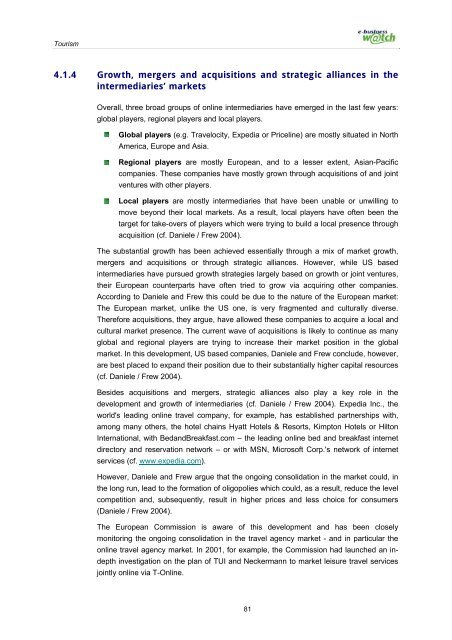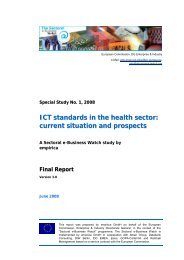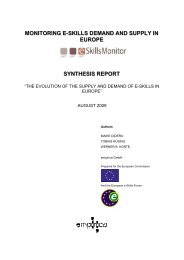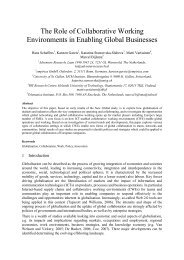ICT and e-business in the tourism industry ICT adoption ... - empirica
ICT and e-business in the tourism industry ICT adoption ... - empirica
ICT and e-business in the tourism industry ICT adoption ... - empirica
Create successful ePaper yourself
Turn your PDF publications into a flip-book with our unique Google optimized e-Paper software.
Tourism<br />
4.1.4 Growth, mergers <strong>and</strong> acquisitions <strong>and</strong> strategic alliances <strong>in</strong> <strong>the</strong><br />
<strong>in</strong>termediaries’ markets<br />
Overall, three broad groups of onl<strong>in</strong>e <strong>in</strong>termediaries have emerged <strong>in</strong> <strong>the</strong> last few years:<br />
global players, regional players <strong>and</strong> local players.<br />
Global players (e.g. Travelocity, Expedia or Pricel<strong>in</strong>e) are mostly situated <strong>in</strong> North<br />
America, Europe <strong>and</strong> Asia.<br />
Regional players are mostly European, <strong>and</strong> to a lesser extent, Asian-Pacific<br />
companies. These companies have mostly grown through acquisitions of <strong>and</strong> jo<strong>in</strong>t<br />
ventures with o<strong>the</strong>r players.<br />
Local players are mostly <strong>in</strong>termediaries that have been unable or unwill<strong>in</strong>g to<br />
move beyond <strong>the</strong>ir local markets. As a result, local players have often been <strong>the</strong><br />
target for take-overs of players which were try<strong>in</strong>g to build a local presence through<br />
acquisition (cf. Daniele / Frew 2004).<br />
The substantial growth has been achieved essentially through a mix of market growth,<br />
mergers <strong>and</strong> acquisitions or through strategic alliances. However, while US based<br />
<strong>in</strong>termediaries have pursued growth strategies largely based on growth or jo<strong>in</strong>t ventures,<br />
<strong>the</strong>ir European counterparts have often tried to grow via acquir<strong>in</strong>g o<strong>the</strong>r companies.<br />
Accord<strong>in</strong>g to Daniele <strong>and</strong> Frew this could be due to <strong>the</strong> nature of <strong>the</strong> European market:<br />
The European market, unlike <strong>the</strong> US one, is very fragmented <strong>and</strong> culturally diverse.<br />
Therefore acquisitions, <strong>the</strong>y argue, have allowed <strong>the</strong>se companies to acquire a local <strong>and</strong><br />
cultural market presence. The current wave of acquisitions is likely to cont<strong>in</strong>ue as many<br />
global <strong>and</strong> regional players are try<strong>in</strong>g to <strong>in</strong>crease <strong>the</strong>ir market position <strong>in</strong> <strong>the</strong> global<br />
market. In this development, US based companies, Daniele <strong>and</strong> Frew conclude, however,<br />
are best placed to exp<strong>and</strong> <strong>the</strong>ir position due to <strong>the</strong>ir substantially higher capital resources<br />
(cf. Daniele / Frew 2004).<br />
Besides acquisitions <strong>and</strong> mergers, strategic alliances also play a key role <strong>in</strong> <strong>the</strong><br />
development <strong>and</strong> growth of <strong>in</strong>termediaries (cf. Daniele / Frew 2004). Expedia Inc., <strong>the</strong><br />
world's lead<strong>in</strong>g onl<strong>in</strong>e travel company, for example, has established partnerships with,<br />
among many o<strong>the</strong>rs, <strong>the</strong> hotel cha<strong>in</strong>s Hyatt Hotels & Resorts, Kimpton Hotels or Hilton<br />
International, with Bed<strong>and</strong>Breakfast.com – <strong>the</strong> lead<strong>in</strong>g onl<strong>in</strong>e bed <strong>and</strong> breakfast <strong>in</strong>ternet<br />
directory <strong>and</strong> reservation network – or with MSN, Microsoft Corp.'s network of <strong>in</strong>ternet<br />
services (cf. www.expedia.com).<br />
However, Daniele <strong>and</strong> Frew argue that <strong>the</strong> ongo<strong>in</strong>g consolidation <strong>in</strong> <strong>the</strong> market could, <strong>in</strong><br />
<strong>the</strong> long run, lead to <strong>the</strong> formation of oligopolies which could, as a result, reduce <strong>the</strong> level<br />
competition <strong>and</strong>, subsequently, result <strong>in</strong> higher prices <strong>and</strong> less choice for consumers<br />
(Daniele / Frew 2004).<br />
The European Commission is aware of this development <strong>and</strong> has been closely<br />
monitor<strong>in</strong>g <strong>the</strong> ongo<strong>in</strong>g consolidation <strong>in</strong> <strong>the</strong> travel agency market - <strong>and</strong> <strong>in</strong> particular <strong>the</strong><br />
onl<strong>in</strong>e travel agency market. In 2001, for example, <strong>the</strong> Commission had launched an <strong>in</strong>depth<br />
<strong>in</strong>vestigation on <strong>the</strong> plan of TUI <strong>and</strong> Neckermann to market leisure travel services<br />
jo<strong>in</strong>tly onl<strong>in</strong>e via T-Onl<strong>in</strong>e.<br />
81

















